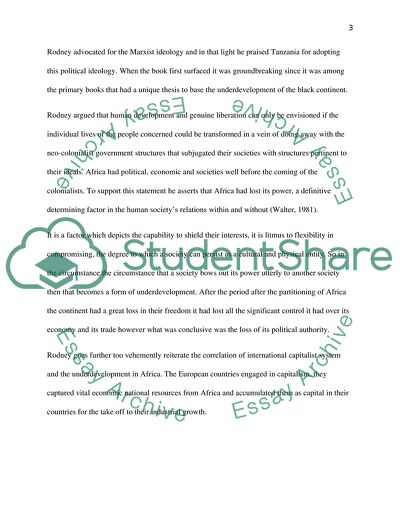Cite this document
(How far Rodney's Theory Explain the Underdevelopment of Africa for European Capitalist Development Essay Example | Topics and Well Written Essays - 2250 words, n.d.)
How far Rodney's Theory Explain the Underdevelopment of Africa for European Capitalist Development Essay Example | Topics and Well Written Essays - 2250 words. https://studentshare.org/history/1798392-walter-rodney-argues-that-europe-underdeveloped-africa-how-far-does-rodneys-theory-explain-the-underdevelopment-of-africa-for-european-capitalist-development
How far Rodney's Theory Explain the Underdevelopment of Africa for European Capitalist Development Essay Example | Topics and Well Written Essays - 2250 words. https://studentshare.org/history/1798392-walter-rodney-argues-that-europe-underdeveloped-africa-how-far-does-rodneys-theory-explain-the-underdevelopment-of-africa-for-european-capitalist-development
(How Far Rodney'S Theory Explain the Underdevelopment of Africa for European Capitalist Development Essay Example | Topics and Well Written Essays - 2250 Words)
How Far Rodney'S Theory Explain the Underdevelopment of Africa for European Capitalist Development Essay Example | Topics and Well Written Essays - 2250 Words. https://studentshare.org/history/1798392-walter-rodney-argues-that-europe-underdeveloped-africa-how-far-does-rodneys-theory-explain-the-underdevelopment-of-africa-for-european-capitalist-development.
How Far Rodney'S Theory Explain the Underdevelopment of Africa for European Capitalist Development Essay Example | Topics and Well Written Essays - 2250 Words. https://studentshare.org/history/1798392-walter-rodney-argues-that-europe-underdeveloped-africa-how-far-does-rodneys-theory-explain-the-underdevelopment-of-africa-for-european-capitalist-development.
“How Far Rodney'S Theory Explain the Underdevelopment of Africa for European Capitalist Development Essay Example | Topics and Well Written Essays - 2250 Words”. https://studentshare.org/history/1798392-walter-rodney-argues-that-europe-underdeveloped-africa-how-far-does-rodneys-theory-explain-the-underdevelopment-of-africa-for-european-capitalist-development.


